Accidents Will Happen

Brief Synopsis
Cast & Crew
William Clemens
Ronald Reagan
Gloria Blondell
Dick Purcell
Sheila Bromley
Addison Richards
Film Details
Technical Specs

Synopsis
Insurance investigator Eric Gregg shows great promise, but he is not advancing fast enough in his career to suit his wife Nona. Eric's shrewd investigation saves the company from liability in a shoe company fire and earns him a raise. Nona is pleased because she is anxious for a fur coat and a new apartment, but when she learns that the raise will not become effective for several weeks, she decides to borrow money to cover her expenses. She approaches the Friend in Need company, a target of Eric's investigations, and they willingly make the loan. When she misses a payment, she offers the company a deal. With her help, the company stages an accident, and when Eric discovers she is a witness, he does not investigate further, trusting her testimony. Dawson, the loan company's ally in the insurance office, discredits Eric and he is fired. Eric confronts Nona and she admits her participation in the fraud and leaves him. Unable to find another job, Eric asks cigarette girl Patricia Carmody to help him with a scheme of his own. Together, the two run successful insurance frauds, forcing his former employer to pay out large sums for claims against them. They attract the attention of Blair Thurston, the head of the loan company, who offers them a job. Eric arranges a high paying scam with Patricia playing the accident victim. Just before they implement the plan, Eric learns that Nona and Thurston are to be married. After the accident, Patricia is called as a witness, but instead of testifying, she reveals that she and Eric were working to uncover Thurston's gang. The gang, including Nona, are jailed, and Eric gets his old job back.

Director
William Clemens
Cast
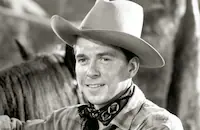
Ronald Reagan
Gloria Blondell
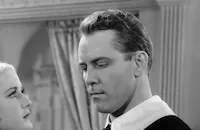
Dick Purcell
Sheila Bromley

Addison Richards

Hugh O'connell
Ellen Clancy
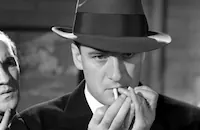
Elliott Sullivan
Anderson Lawlor
Spec O'donnell
Kenneth Harlan
Don Barclay
Earl Dwire
Max Hoffman Jr.
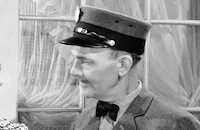
John Butler
Allan Cavan

Willard Parker
Al Herman
Betty Farrington
Stuart Holmes
Mary Doyle
Frank Shannon
Max Wagner
Jack Wise
Myrtle Stedman
John Harron
Cliff Saum
George Guhl
Jeffrey Sayre
Allan Conrad
Milt Kibbee

Wilfred Lucas
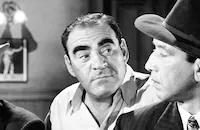
Ralph Dunn
Richard Kipling
Huey White
William Worthington
Bernard Suss
Loretta Rush
Pat O'malley
Jimmy Fox
Betty Mack
Ralph Peters
Fern Barry
Clinton Rosemond
Crew
George Bricker
George Bricker
Anthony Coldeway
Bryan Foy
Morton Grant
Charles Lang
Charles Novi
L. Wm. O'connell
Thomas Pratt
Victor Rose
Victor Rose
Bob Ross
Vincent Sherman
Howard Shoup
Jack L. Warner

Film Details
Technical Specs

Articles
Accidents Will Happen
Accidents Will Happen was produced by Brian Foy (House of Wax, 1953), one of vaudeville's "Seven Little Foys", who rose through the Hollywood ranks after his beginnings as a gag writer for Buster Keaton. He would become known as "keeper of the Bs" for Warner Bros., churning out potboilers with "ripped-from-the-headlines" plotlines, too gritty for bigger budget pictures. It was to his kingdom that a young Reagan was sent, shortly after his role in the bizarre musical adaptation of the play Swing Your Lady (1938) - perhaps as a result.
As in most of his films during this era, Reagan appears as an enthusiastic social reformer, working with authorities to bring the racketeers to justice. Produced during a time when insurance scams ran rampant in daily newspaper stories, the subject matter was pure Foy. Interestingly, though, according to Stephen Vaughn's Ronald Reagan in Hollywood, the film's storyline might also have been influenced by realities at Warner Bros. at that time. "In 1938 the studio had turned to insurance companies for financial backing. Small wonder that this picture....warned audiences against such fraud."
Whatever the story's inspiration, for censors, it was a little too realistic. Since the Production Code Administration (PCA) believed that illegal activity in a film would likely be mimicked by real-life criminals, restrictions about what type of crimes could be shown and how the criminals themselves could be represented were severe; for example, criminals could never be depicted as role models in a film. Arson, which Gregg investigates early in the picture, was considered too dangerous to ever be the main theme of a film. As a result, Jack Warner was warned to clearly distinguish between racketeers and legal loan companies to limit objections from the latter.
Reportedly, Reagan dealt with the frustration of his B-movie tenure by enjoying the off-screen company of his leading ladies. Sheila Bromley, the greedy and conniving Mrs. Gregg, was one actress Reagan would have enjoyed dating, but to no avail.
Gloria Blondell, Reagan's wholesome love interest in the film, did not experience the same high profile career her sister Joan enjoyed. She was the first wife of producer Albert R. Broccoli and, reportedly, the first choice for the role of Blondie Bumstead when the Blondie and Dagwood comic strip came to film in 1938, a part which eventually went to Penny Singleton.
Accidents Will Happen was successful enough to boost Reagan back into the A ranks, at least temporarily, for Cowboy from Brooklyn (1938), with Dick Powell and Pat O'Brien. But he would return to work seven more times with Foy, their last film together being The Winning Team (1952), in which he co-stars with Doris Day. In between these "B-keeper" projects, Reagan made some of his best known films, Knute Rockne All American (1940) and Kings Row (1942).
Director: William Clemens
Screenplay: Anthony Coldeway (screenplay), George Bricker (story and screenplay); Morton Grant (uncredited screenplay); Victor Rose (uncredited contributor to treatment)
Cinematography: L. Wm. O'Connell
Art Direction: Charles Novi
Music: Howard Jackson (uncredited)
Film Editing: Thomas Pratt
Cast: Ronald Reagan (Eric Gregg), Gloria Blondell (Patricia 'Pat'/'Patty' Carmody), Dick Purcell (Jim Faber), Sheila Bromley (Nona Gregg), Addison Richards (Blair Thurston), Hugh O'Connell (John J. 'J.J.' Oldham), Ellen Clancy (Mary Tarlton, Gregg's secretary), Elliott Sullivan (Burley Thorne), Anderson Lawlor (F.R. Dawson), Spec O'Donnell ('Specs' Carter).
BW-61m.
by Emily Soares

Accidents Will Happen
Ronald Reagan, 1911-2004 - TCM Remembers Ronald Reagan
Ronald Reagan, the actor turned elected official whose fascinating career saw him develop as a contract player for Warner Brothers studios, to a politician who fulfilled his ambitions by becoming the 40th President of the United States, died at his home in Los Angeles on June 5 after a long battle with Alzheimer's disease. He was 93.
He was born Ronald Wilson Reagan on February 6, 1911 in Tampico, Illinois to John and Nelle Reagan. When Reagan was nine, his family settled down in the small community of Dixon, about 100 miles west of Chicago. After high school, Reagan enrolled in Eureka College, a small Christian school near Peoria. He graduated in 1932 with a degree in Economics, and pursued a career in broadcasting. His first gig was as a part-time announcer at WOC in Davenport, Iowa. Within a year, WOC had merged with its big-sister station, WHO in Des Moines, and Reagan was hired as a sports announcer.
In the spring of 1937, Reagan drove to Southern California to catch the Chicago Cubs in spring training on Santa Catalina Island. While he was in California, he wrangled a screen test and signed a contract for $200 a week with Warner Brothers. His film debut was rather inauspicious; he portrayed a radio announcer in an innocuous comedy Love is on the Air (1937). He made a few more "B" programmers like Hollywood Hotel (also 1937), and Girls on Probation (1938), before getting his first prominent role opposite Bette Davis in the popular tearjerker, Dark Victory (1939).
Although he seldom got credit for being a good actor, there was no denying that Reagan held his own given the right material: Knute Rockne, All American as the doomed Notre Dame football hero George "The Gipper" Gipp, where he delivered the film's immortal line "Win one for the Gipper!"; Santa Fe Trail in which he ably supports Errol Flynn in one of the boxoffice hits of its era (both 1940); Kings Row (1941), featuring one of his finest performances as a small-town playboy whose legs are amputated by a careless surgeon; and Desperate Journey (1942) where he again supported Flynn in an exciting action picture.
Due to his poor eyesight, Reagan didn't see any action in World War II, so the studio heads assigned him to star in a series of patriotic films produced by the First Motion Picture Unit of the Army Air Forces in Culver City. Between 1942-45, Reagan starred in over 400 of these films. After the war, Reagan still found some good roles: The Voice of the Turtle (1947) proved he had a deft hand at light comedy opposite Eleanor Parker; The Hasty Heart (1949) offered another underrated performance as he ably portrayed the Yank in John Patrick's much heralded wartime play; and Storm Warning (1950) was a slick melodrama that cast Reagan as a crusading District Attorney determined to bring the KKK in a small southern town, with the help of Doris Day and Ginger Rogers!
It was around this time that Reagan became involved in politics. In 1947, he began a five-year term as president of the Screen Actors Guild (SAG), and testified in October of that year before the newly formed House Un-American Activities Committee (HUAC). He identified suspected Communists Larry Parks, Howard Da Silva and Alexander Knox, all of whom were subsequently called to testify, and subsequently blacklisted. Later records showed Reagan was so concerned about the Communist influence in Hollywood, that he became an FBI informer.
As Reagan became steeped in his political career, his parts throughout the '50s became inferior: the notorious Bedtime for Bonzo (1951); the coy "sex" comedy She's Working Her Way Through College (1952) that cast him as a college professor who romances a stripper! (Virginia Mayo); Cattle Queen of Montana (1955), a sluggish Western that even the redoubtable Barbara Stanwyck couldn't save; and finally Hellcats of the Navy (1957), a stodgy war picture that would be his only film that co-starred his wife Nancy (Davis).
Television offered some salvation. For eight years, (1954-62), Reagan served as the host of General Electric Theater, a televised series of dramas. He also found a niche as GE's goodwill ambassador to employees and to civic and business groups around the country, furthering his taste and honing his craft as a public official. By the mid '60s, Reagan would move into politics entirely, save for one last film, the thrilling The Killers (1964), Reagan's only known villainous role, as a murderous gangster. That same year, he actively campaigned for Republican Presidential candidate Barry Goldwater, although Goldwater lost to Lyndon B. Johnson.
Reagan whose profile was riding high, had cemented his future as a successful politician. In 1966, he ran against incumbent Governor Pat Brown for the state of California and won, serving successfully for two terms until 1974.
Reagan began an all-out, two-year drive to wrest the 1976 nomination from incumbent Gerald R. Ford, an appointed vice president who became president on the resignation of Nixon. Reagan fell short by a handful of delegates to the Republican national convention. But Ford lost to Jimmy Carter, and Reagan became the front-runner to challenge Carter in 1980. After defeating Carter, Reagan held two terms as President of the United States (1981-89). After his second term was over, he retired quietly in California. In 1994, it was revealed to the media that Reagan was suffering from Alzheimer's disease; he had been kept out of the public eye since then.
He was married briefly to actress Jane Wyman (1940-48), and had two children; a daughter Maureen and an adopted son, Michael. In 1952, he married a budding film starlet, Nancy Davis, who bore him two more children; a daughter, Patty; and a son, Ronald Jr. Ronald Reagan is survived by Nancy, Michael, Patty and Ron Jr. His daughter Maureen died of Melanoma in 2001 at the age of 60.
by Michael T. Toole
Ronald Reagan, 1911-2004 - TCM Remembers Ronald Reagan
Quotes
Trivia
Notes
Although the actress portraying "Mary Tarlton" is credited onscreen as "Ellen Clancy," some contemporary sources list her as "Janet Shaw," the name she used in all of her subsequent films. Contemporary sources note that actual insurance frauds similar to the ones depicted in the film were making headlines in the newpapers at the time the movie was written. This was Gloria Blondell's first Warner Bros. assignment.

Miscellaneous Notes
Released in United States Spring April 23, 1938
Released in United States Spring April 23, 1938














